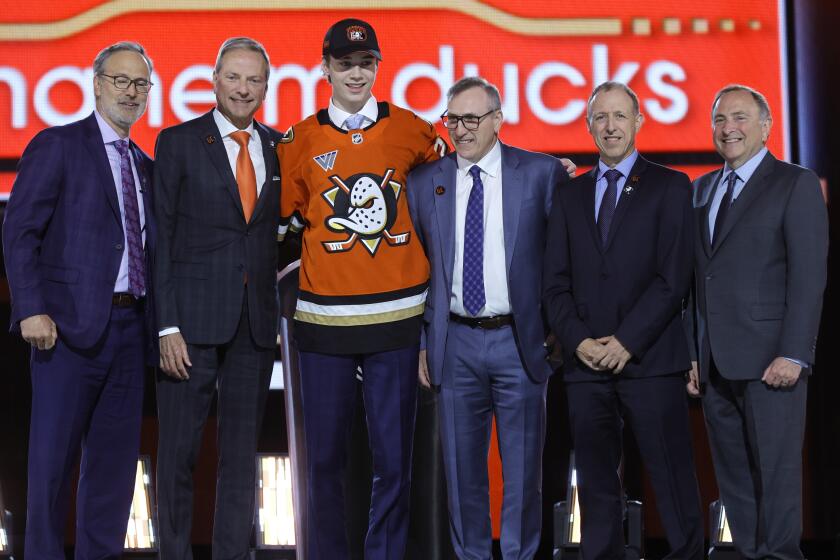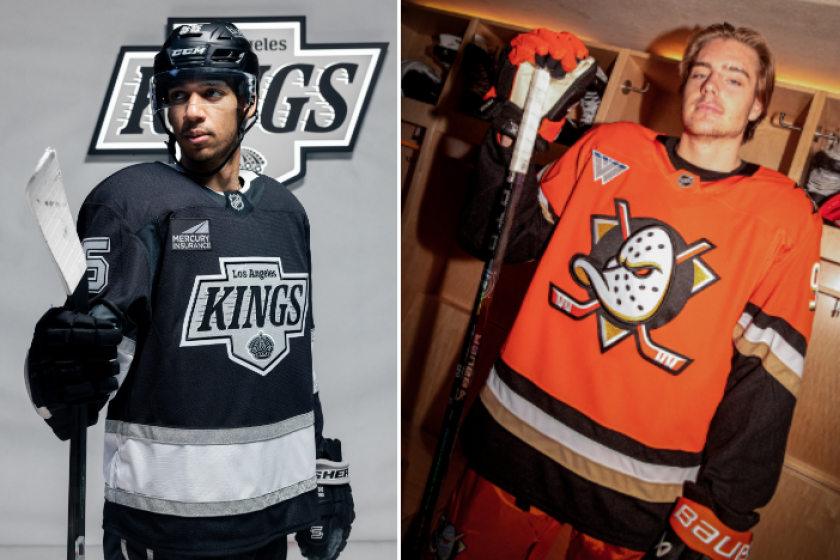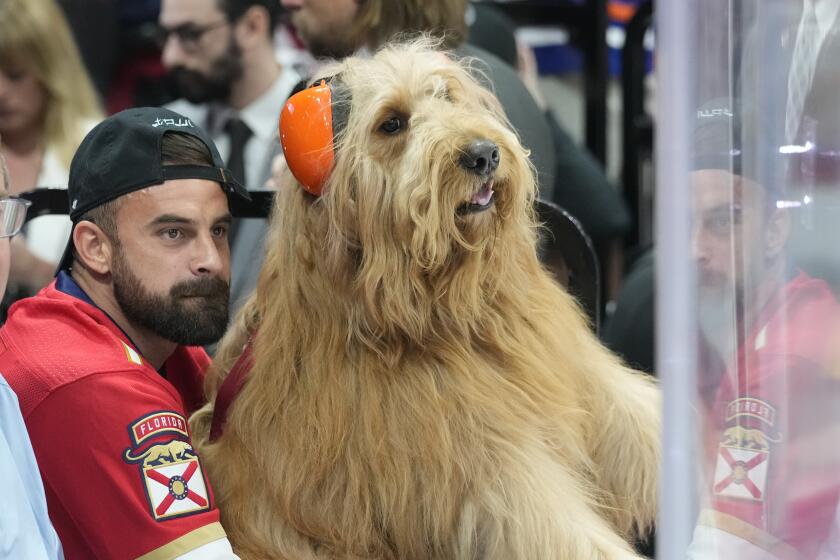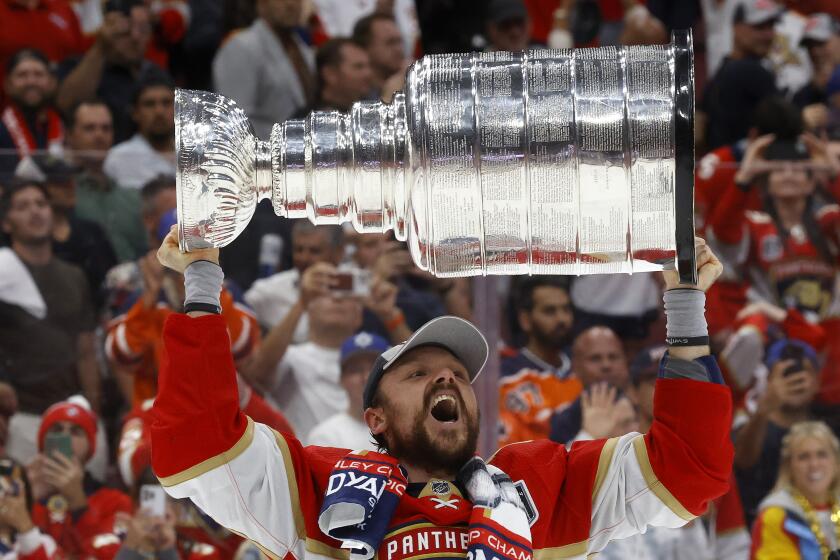Players Stage First NHL Strike : Hockey: After 75 years of no job action, they vote, 560-4, to walk out when talks remain deadlocked.
After operating without interruption for 75 years, after operating without a collective bargaining agreement for 6 1/2 months, after 60 hours of furious, often bitter negotiations between management and the players’ union over the final week, and after a 51-hour strike delay, the NHL came to a halt at noon PST Wednesday when its 564 players staged a walkout.
Late Tuesday and early Wednesday, members of the league’s 22 clubs met, reviewed the last proposal by the owners and watched a video from Bob Goodenow, executive director of the NHL Players Assn.
Then, the players voted, approving a strike by a count of 560-4.
“The vote results prove the players’ dissatisfaction with the owners’ final offer,” said Goodenow in Toronto. “A vote to reject was a vote to strike. . . . There will be no games tonight.”
The strike killed three games scheduled for Wednesday and leaves 27 regular-season games to be played followed by the Stanley Cup playoffs, scheduled to begin on Wednesday.
There have been strikes in both the NFL and major league baseball, but never before has a league gone out on the eve of its postseason. By doing so, the players were able to collect nearly all of their salary. Although the average salary is about $375,000, players receive only bonuses from the postseason, from $3,000 a man for first-round losers to $25,000 for the Stanley Cup champions.
The owners could make as much as $15 million.
Said King owner Bruce McNall: “I don’t appreciate when somebody is paid to do a job and they leave with that job half done. I don’t think that’s fair. I’m stunned at the walkout. They should give the fans what they’ve already been paid for and honor their contracts. God forbid if I didn’t honor a contract, if I said, ‘I’m not going to honor your contract because I don’t like the way you’re playing.’
“What a wonderful 75th anniversary, huh?”
McNall is genuinely liked by his players, understandable since he has the highest payroll in the league at $13.5 million and has spent an additional $5 million to provide the club with a private jet.
“This is not something the L.A. Kings are pleased about,” said Marty McSorley, the club’s player representative of Wednesday’s vote. “We did it regretfully because our owner, Bruce McNall, has been very good to us. We did it reluctantly and hope that the strike is over as soon as possible.”
McSorley declined to reveal whether any of the four votes against the strike had been cast by a King.
“I wouldn’t do that to my players,” he said.
It appeared last weekend that a settlement might be imminent. The owners made a proposal late Saturday night for a one-year agreement and the players countered with their own three-year offer Sunday.
The back-and-forth dialogue has resulted in some progress. The two sides have reached basic agreements in free agency, once a major problem.
Owners and players also seem agreeable to adding four games to the regular-season schedule to produce additional revenue. Those games would be played at neutral sites, either in North America or perhaps Europe or the Orient. In exchange, the exhibition season would be cut from 11 games to nine and the extra regular-season game with either the former Soviet Union or the Olympians would be eliminated.
That has pushed merchandising and hockey-card revenue to the forefront. Once a minor merchandising tool, hockey cards have become a big business in themselves, generating a revenue of around $16 million annually. The players’ union gets 68% of that figure, or $11 million.
The players say the owners want a larger chunk. Not so, the owners insist.
The owners say they have agreed to leave the merchandising agreement the way it is for one year, then perhaps look at increasing their share, which they say they are clearly entitled to under the language of the standard players’ contract. The players say they want the merchandising agreement to stay the way it is and want the owners to agree to that in the new collective bargaining agreement.
While the owners freely discuss the issues and their latest offer, the players have been reluctant to do so.
Although the Montreal Canadiens’ Kirk Muller was hesitant to get into specifics about the negotiations, he did say the “the big (issue) right now really is licensing. It seems like we’re pretty far off on that.”
But there are other issues as well to be resolved, from the size of the entry draft to the size of the postseason payoff pot for players to the size of the pension plan.
Both sides say no single issue is preventing an agreement, but rather the combination of them along with a basic disagreement over just how much more the owners can afford to give the players.
The owners are sticking by their claim that they will lose $9 million this season, but concede that does not include the $150-million entry fee they are receiving from the three new expansion teams, the San Jose Sharks, Tampa Bay Lightning and Ottawa Senators.
The players say the owners will make $24 million.
But the talks go on.
Wednesday night, eight members of the owners’ committee and four from the union met in separate sessions at the Toronto hotel where they had broken off negotiations over the weekend.
“If we can reach an agreement, this would enable the season and the playoffs to go forward,” Goodenow said. “The question is: Are the owners prepared to continue the negotiations and use the time constructively?”
Marcel Aubut, owner of the Quebec Nordiques, wasn’t hopeful of a quick settlement.
“I don’t think we will accomplish anything tonight,” he said.
Asked how long the strike could last before the playoffs are canceled, Aubut said: “We’re talking about 15 days as a limit, but that’s not confirmed.”
McNall, however, said the Kings were looking at possible playoff dates at the Forum into July.
At Issue
A look at some of the issues in the NHL labor dispute:
LENGTH OF CONTRACT: Both sides agreed to make the 1991-92 season retroactive. The NHL is seeking one year plus an option, taking the agreement to the end of the 1993-94 season. The option would go into effect if salary hikes were kept under 15% in 1992-93. The players want a three-year deal, taking it to the end of 1994-95 season.
LENGTH OF SCHEDULE: Both sides apparently have agreed to an 84-game schedule. Games 81 and 82 would be played in NHL cities, Games 83 and 84 in other venues, possibly including Europe.
FREE AGENCY: There are currently three groups: Group 1 for players 23 and under with fewer than five years of experience; Group 2 for players 24 to 30; Group 3 for players 31 and over.
Players were willing to meet the owners at age 30 for Group 3, but there is not complete agreement on compensation for Groups 1 and 2, which would be combined into one group.
Owners propose: Compensation for new free agents under age 29 would be determined by salaries. Under $200,000, no compensation; $200,001-$250,000, third-round draft pick; $250,001-$350,000, second-round draft pick; $350,001-$500,000, first-round draft pick; $500,001-$1 million, two first-round draft picks; more than $1 million, three first-round draft picks.
There would be no compensation for signing players over age 30, but teams would retain the right to match offers.
The owners claim the new free-agency proposal would create an average salary of at least $420,000, up from $379,000.
MEDICAL PLAN: The owners have proposed a medical plan that would offer lifetime coverage and unlimited dollar amounts.
ARBITRATION: This is still to be negotiated. The players want independent arbitrators as in baseball.
LICENSING: The owners say players have received hockey-card money over the years to which they were not contracturally entitled. The players refuse to negotiate over card revenues. The owners maintain they will allow a status quo for one year, but want to renegotiate beyond that.
PLAYOFF MONEY: The players wanted $60,000 per man for members of the Stanley Cup champions, but settled for $40,000. The bonus is currently $25,000.
DRAFT: The players asked for the draft to be reduced from 12 rounds to six. The owners offered a reduction to 10 rounds, but also offered to reduce the supplementary draft from two rounds to one.
PENSION: Owners offered a deal they said would give the average player a pension of $430,000 a year for life at age 62, a figure the players dispute. There is also a dispute over a surplus from the pension fund established in 1966.
KINGS TAKE A WALK: Despite their allegiances to owner Bruce McNall, they vote to join their brethren on the 21 other NHL clubs in approving a strike. C4
More to Read
Go beyond the scoreboard
Get the latest on L.A.'s teams in the daily Sports Report newsletter.
You may occasionally receive promotional content from the Los Angeles Times.




